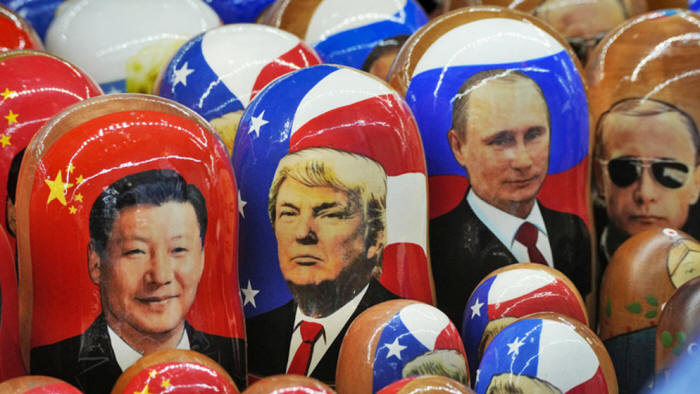|
by Vasily Kashin March 03, 2025 from Profile Website translation by The RT Team March 08, 2025 from RT Website
FILE PHOTO: Traditional Russian wooden dolls called Matryoshka depicting China's President Xi Jinping, US President Donald Trump and Russian President Vladimir Putin. © AP Photo / Dmitri Lovetsky
The US is resetting,
but not how the
world expected...
The new administration is rapidly dismantling the
old order, purging the ruling elite, reshaping both domestic and
foreign policy, and cementing changes that will be difficult to
reverse - even if his opponents regain power in future elections.
Unlike traditional empires built on territorial expansion, the American empire extended its reach through financial dominance, military alliances, and ideological influence.
Since the late 1990s, the costs of maintaining
global hegemony have exceeded the benefits, fueling discontent both
at home and abroad.
Trump has openly praised this era, viewing it as
the golden age of US prosperity, before the country took on
the burdens of global leadership. Under this vision, America will reduce unproductive foreign expenditures and refocus on its natural advantages:
However, the transition to this model carries significant risks, particularly in a highly globalized economy.
His administration is systematically dismantling key institutions of the old order, including those that irritated Moscow.
For instance,
Ironically, Trump had more motivation to
destroy USAID than even Russian President Vladimir Putin,
given that its resources had been repurposed for domestic political
use by Trump's rivals.
China, however, remains Trump's top adversary.
Unlike Biden, who sought to counter China through alliances, Trump is willing to go it alone - potentially weakening Western unity in the process.
His administration is expected to escalate
economic and technological warfare against Beijing, even if it means
alienating European allies.
Europe's
strategic uncertainty
His vice president, J.D. Vance, recently
delivered a speech in Munich that
amounted to direct interference in European politics, signaling
support for right-wing nationalist movements that challenge the EU's
authority.
For years, China has viewed Western Europe as an 'alternative West' with which it could engage economically without the same level of confrontation it faces with the US.
Trump's approach could accelerate EU-Chinese
ties, especially if Western European leaders feel abandoned
by Washington.
At the same time, the ambitions of some Europeans for NATO expansion into the Indo-Pacific may falter, as the bloc struggles to define its new role in a post-globalist US strategy.
The Russia-China partnership is built on strong fundamentals:
If anything, the shifting geopolitical landscape could push Russia into a position similar to that of China in the early 2000s - focusing on economic development while maintaining strategic flexibility.
Moscow may reduce its efforts to actively
undermine the US and instead concentrate on strengthening its
economic and security ties with Beijing. China, meanwhile, will bear the brunt of Trump's new American empire...
The US will no longer rely on alliances to contain Beijing but will use direct economic and military pressure.
China has been preparing for economic decoupling
for years, and Beijing may find opportunities in a more divided
Western world.
The road ahead
The US is moving away from being a liberal empire and toward a more transactional, power-based foreign policy
The question is whether Beijing can adapt to a world where the US is no longer just containing it but actively trying to roll back its economic influence.
The EU is losing its privileged status as America's primary partner and is being forced to fend for itself.
One thing is certain:
Trump's America is rewriting the playbook, and,
|


